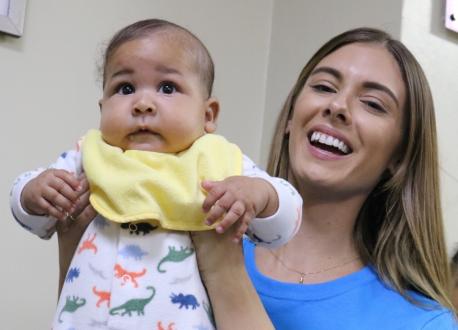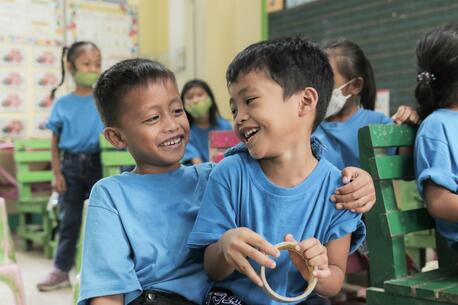
UNICEF NextGen Is Protecting Babies and New Moms in the DR
UNICEF Next Generation members are using their influence to lower maternal and neonatal mortality rates across the Dominican Republic.
The young philanthropic leaders, entrepreneurs and innovators who belong to the UNICEF Next Generation community serve as high-touch volunteers, though the term ‘consultant’ might better describe all the ways they use their brain power, technical skills and connections to support UNICEF.
Above all, NextGeners share a commitment to UNICEF’s mission: to advocate for the protection of children's rights, to help meet their basic needs and to expand their opportunities to reach their full potential.
UNICEF Next Generation members share a commitment to saving and protecting the world's children
Every year, UNICEF NextGen leaders from across the world gather in a new location for the Annual NextGen Global Summit. The summit combines an abbreviated UNICEF field visit with workshopping and strategic planning sessions.
For the first two days, NextGen leaders are immersed in UNICEF’s in-country work, observing UNICEF’s impact and meeting with (and playing with) children who are part of UNICEF’s programming. The following day is a jam-packed “leadership summit,” where NextGeners lead their peers in workshops on fundraising, advocacy and engagement and strategize on how best to meet their citywide and nationwide fundraising goals.
The outcome? NextGen members gain invaluable firsthand experience from spending two full days with UNICEF and partners in the field and develop their leadership skills in an effort to enhance the NextGen program as a whole.
In February 2019, members of UNICEF Next Generation traveled to the Dominican Republic for the Annual NextGen Global Summit. At San Lorenzo de Los Minas Maternal and Infant Hospital, they observed some of the challenges faced by health professionals in a country with high levels of inequality. © Bolivar Orozco for UNICEF USA
In February 2019, NextGen leaders traveled to the Dominican Republic to see how UNICEF is implementing programs to improve maternal and neonatal health care. While the DR is a middle-income country, it suffers from high levels of inequality and low basic social indicators in many categories, which requires a unique scope of work for our colleagues at UNICEF RD.
UNICEF staff in the DR use a strategic methodology to inform their work to support children in the region. This begins with a combination of research and situation analysis to locate violations or gaps that prevent children from surviving and thriving.
Young leaders traveled to the Dominican Republic for this year's Annual NextGen Global Summit
Once a gap is identified, and after it's determined that no other partners (Government, civil society organizations, etc.) are working to sufficiently address this need, UNICEF staff develop a pilot program and test it on a small scale (for example, in a single hospital).
If this pilot program yields positive results — i.e. infant mortality and maternal mortality decrease — UNICEF will scale up the project. In this case, that means introducing the program in more public maternity hospitals across the region.
A new mother cradles her sleeping baby at San Lorenzo do Los Mina Maternal and Infant Hospital in Santo Domingo, Dominican Republic in February 2019. The UNICEF NextGen community is raising $100,000 to improve maternal and neonatal health in the DR.
Approximately 200,000 babies are born in the Dominican Republic annually, 60 percent of them in public hospitals, yet around 200 pregnant women and 4,000 newborns die every year, despite the fact that almost all women receive prenatal care and almost all babies are delivered in hospitals by qualified health personnel. These numbers put the DR in last place among Latin American and Caribbean countries. UNICEF RD recognizes that these deaths are preventable and devised the Mothers and Babies in Good Care Initiative in order to reduce maternal and neonatal mortality.
UNICEF's Mothers and Babies in Good Care Initiative will reduce infant and maternal mortality in the Dominican Republic
The initiative will focus on ten hospitals and community health centers in areas with the highest infant and maternal mortality rates. With NextGen's support, at the end of the three-year period, at least 45,000 babies will be born in safe conditions and will be able to develop to their full potential. In addition, mothers will be treated with dignity, protected from obstetric violence and, overall, will receive better quality of care.
To see how the initiative works, NextGeners visited two public maternity hospitals in Santo Domingo. The first group toured San Lorenzo do Los Minas Maternal and Infant Hospital. The others visited Dr Renaldo Almanzar Maternal and Infant Hospital, where the staff had already begun implementing UNICEF's checklist of necessary steps to ensure that mothers and babies receive quality care. The hospital was impressive. A few NextGen members commented that the facility reminded them of the New York City hospital where their niece or nephew was born.
A mother and her newborn rest at San Lorenzo de Los Mina Maternal and Infant Hospital in Santo Domingo, Dominican Republic in February 2019. UNICEF's Mothers and Babies in Good Care Initiative encourages exclusive breastfeeding to prevent neonatal and infant mortality and to facilitate growth and healthy brain development. Currently, only 4 percent of newborns in the DR are exclusively breastfed during the first six months of life.
At dinner, NextGeners were eager to chime in with their observations and impressions on the two very different hospitals we'd seen. The group went silent when a NextGen member shared her surprise to learn how limited the resources were at San Lorenzo do Los Minos. “It wasn’t until I went to the bathroom,” she recalled, "and found that I couldn’t wash my hands, because there was no running water, that I understood how maternal and neonatal death rates in the region could be so high.”
NextGeners were shocked to discover that one hospital they visited lacked running water
We let this chilling thought settle in the room. In the hospital we had all walked through earlier that day, surgeons operate and babies are delivered without access to running water. In light of this, it should come as no surprise that one of the leading causes of neonatal mortality in maternal hospitals is bacterial sepsis, which leads to infection, but can be easily prevented by improving hygiene practices and basic health services.
A doctor examines a newborn at San Lorenzo de Los Mina Maternal and Infant Hospital in Santo Domingo, Dominican Republic in February 2019.
After seeing these hospitals firsthand, our NextGen supporters are galvanized to activate their networks. Through a combination of individual giving, gifts from family foundations, corporate giving and fundraising events, NextGen will raise $100,000 to support the Mothers and Babies in Good Care Initiative.
After seeing the needs of maternal hospitals firsthand, NextGen supporters are galvanized to activate their networks
These funds enable UNICEF to continue efforts to reduce maternal and newborn mortality in the DR through systemic change in hospital care and practices as well as improved nutrition through the promotion of breastfeeding. UNICEF is committed to scaling up the Mothers and Babies in Good Care Initiative at all maternity public hospitals and converting the initiative's interventions into the national health policy.
If you’d like to be a part of the NextGen community and are inspired to help us hit our goal to support mothers and babies in the Dominican Republic, please sign up here or reach out to nextgen@unicefusa.org to learn more.
UNICEF Next Generation Manager Bridget Harvey is based in New York City.
Top photo: UNICEF NextGen influencer and Wilhelmina model Carmella Rose visits San Lorenzo do Los Minas Maternal and Neonatal Hospital in Santo Domingo, Dominican Republic in February 2019. All photos © Bolivar Orozco for UNICEF USA
HOW TO HELP
There are many ways to make a difference
War, famine, poverty, natural disasters — threats to the world's children keep coming. But UNICEF won't stop working to keep children healthy and safe.
UNICEF works in over 190 countries and territories — more places than any other children's organization. UNICEF has the world's largest humanitarian warehouse and, when disaster strikes, can get supplies almost anywhere within 72 hours. Constantly innovating, always advocating for a better world for children, UNICEF works to ensure that every child can grow up healthy, educated, protected and respected.
Would you like to help give all children the opportunity to reach their full potential? There are many ways to get involved.





